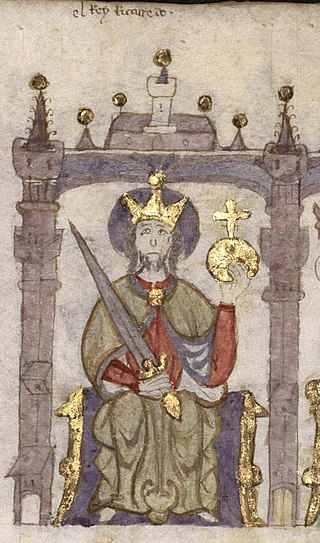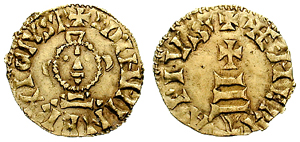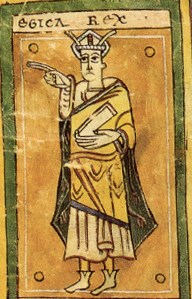
In Christian churches with episcopal polity, the rank of metropolitan bishop, or simply metropolitan, pertains to the diocesan bishop or archbishop of a metropolis.

The Visigothic Code, also called Lex Visigothorum, is a set of laws first promulgated by king Chindasuinth of the Visigothic Kingdom in his second year of rule (642–643) that survives only in fragments. In 654 his son, king Recceswinth (649–672), published the enlarged law code, which was the first law code that applied equally to the conquering Goths and the general population, of which the majority had Roman roots, and had lived under Roman laws.

Reccared I was Visigothic King of Hispania and Septimania. His reign marked a climactic shift in history, with the king's renunciation of Arianism in favour of Roman Christianity in 587.

The Third Council of Toledo (589) marks the entry of Visigothic Spain into the Catholic Church, and is known for codifying the filioque clause into Western Christianity. The council also enacted restrictions on Jews, and the conversion of the country to Catholic Christianity led to repeated conflict with the Jews.

The Synod of Elvira was an ecclesiastical synod held at Elvira in the Roman province of Hispania Baetica, now Granada in southern Spain. Its date has not been exactly determined but is believed to be in the first quarter of the fourth century, approximately 305–6. It was one of three councils, together with the Synod of Arles (314) and the Synod of Ancyra, that first approached the character of general councils and prepared the way for the first ecumenical council. It was attended by nineteen bishops and twenty-six presbyters, mostly resident in Baetica. Deacons and laymen were also present. Eighty-one canons are recorded, although it is believed that many were added at later dates. All concern order, discipline and conduct among the Christian community. Canon 36, forbidding the use of images in churches, became a bone of contention between Catholic and Protestant scholars after the Protestant Reformation.

Wamba was the king of the Visigoths from 672 to 680. During his reign, the Visigothic kingdom encompassed all of Hispania and part of southern Gaul known as Septimania.

Erwig was a king of the Visigoths in Hispania (680–687).

Wittiza was the Visigothic King of Hispania from 694 until his death, co-ruling with his father, Egica, until 702 or 703.

Egica, Ergica, or Egicca (c. 640 – 701/703), was the Visigoth King of Hispania and Septimania from 687 until his death. He was the son of Ariberga and the nephew of Wamba.
Julian of Toledo (642–690) was born in Toledo, Hispania. He was well educated at the cathedral school, was a monk and later abbot at Agali, a spiritual student of Saint Eugene II, and archbishop of Toledo. He was the first bishop to have primacy over the entire Iberian Peninsula—a position he has been accused of securing by being complicit in 680 in the supposed poisoning of Wamba, king of the Visigoths—and he helped centralize the Iberian Church in Toledo. His elevation to the position of primate of the Visigothic church was a source of great unhappiness among the kingdom's clergy. And his views regarding the doctrine of the Trinity proved distressing to the Vatican.
The Seventeenth Council of Toledo first met on 9 November 694 under Visigothic King Egica. It was the king's third council and primarily directed, as was the Sixteenth, against the Jews, for whom Egica seems to have had a profound distrust and dislike.
The Fifteenth Council of Toledo first met in Toledo, Spain on 11 May 688 under Visigothic King Egica. It was the first of his three councils.
The Fourteenth Council of Toledo first met in Toledo, Spain, on 14 November 684 under Visigothic King Erwig. It was called in response to a letter from Pope Leo II directing the king, a Count Simplicius, and the recently deceased Quiricus, metropolitan of Toledo, to call a general council to confirm the decisions of the ecumenical Third Council of Constantinople against monothelitism.
The Sixteenth Council of Toledo first met in Toledo, Spain on 25 April 693. It was the second of three councils convened by Visigothic king Egica.
The Tenth Council of Toledo was summoned to meet in Toledo on 1 December 656 by King Reccesuinth of Hispania.
The Ninth Council of Toledo was a provincial synod of bishops of Carthaginiensis. It began on 2 November 655 under the auspices of King Reccesuinth. It ended on November 24 in the Church of Santa María.

Masona or Mausona was the Bishop of Mérida and metropolitan of the province of Lusitania from about 570 until his death. He is famous for exercising de facto rule of the city of Mérida during his tenure as bishop and for founding the first confirmed hospital in Spain.
The Primacy of the Spains is the primacy of the Iberian Peninsula, historically known as Hispania or in the plural as the Spains. The Archbishop of Braga, in Portugal, has claimed this primacy over the whole Iberian Peninsula since the middle ages, however today his primacy is only recognized in Portugal. The Archbishop of Toledo in Spain has claimed the Primacy of Spain, as the primate above all other episcopal sees in Spain. In addition, the Archbishop of Tarragona in Catalonia also makes use of the title. The Archbishops in Braga, Toledo and Tarragona, if raised to the rank of cardinal, are known as Cardinal-Primates.
The Catholic Church in Spain has a long history, starting in the 1st century. It is the largest religion in Spain, with 58.6% of Spaniards identifying as Catholic.
Jus antiquum is a period in the legal history of the Catholic Church, spanning from the beginning of the church to the Decretum of Gratian, i.e. from A.D. 33 to around 1150. In the first 10 centuries of the church, there was a great proliferation of canonical collections, mostly assembled by private individuals and not by church authority as such.